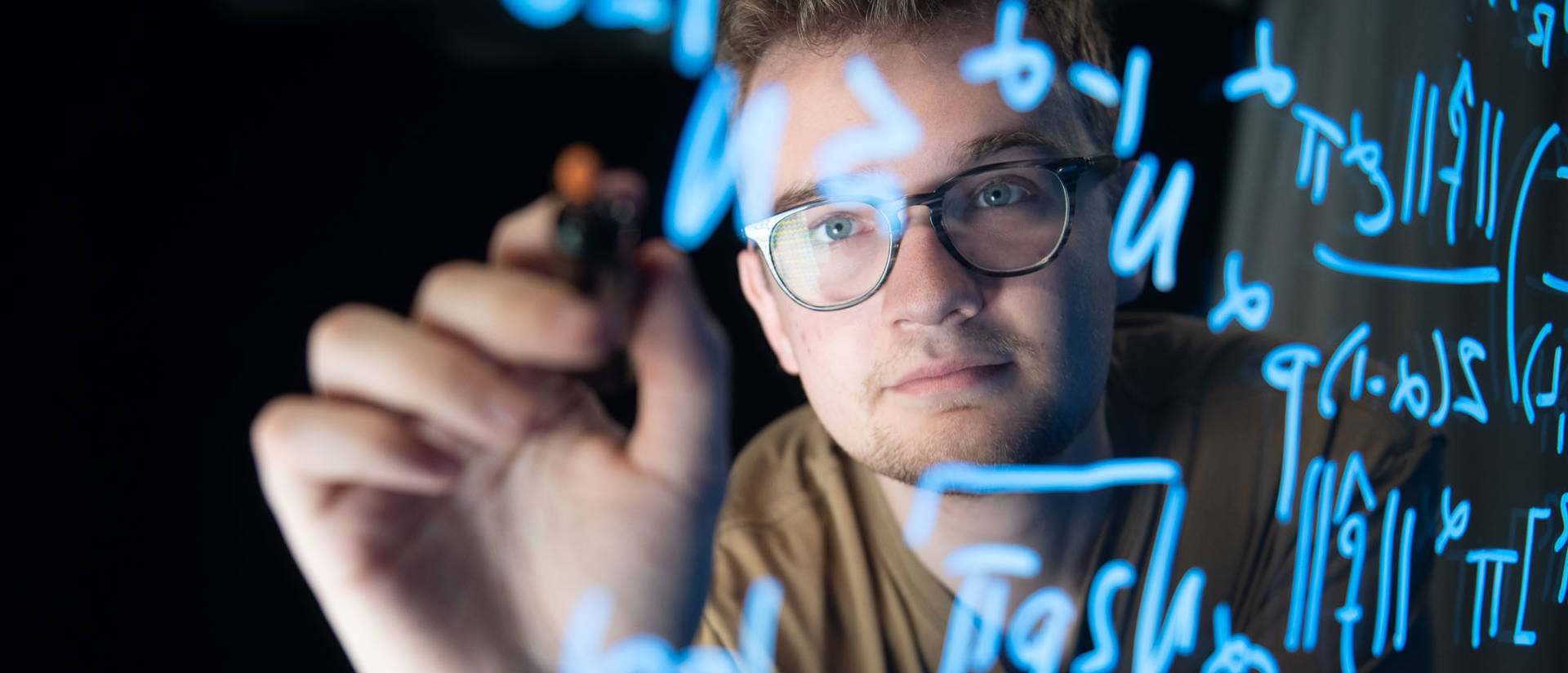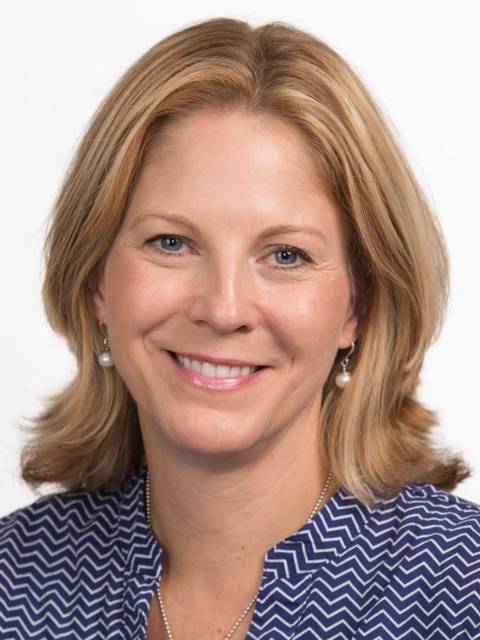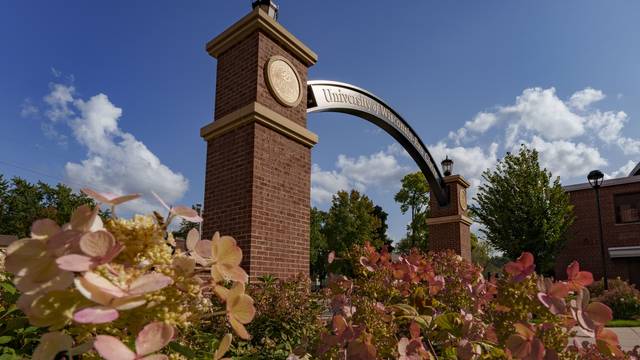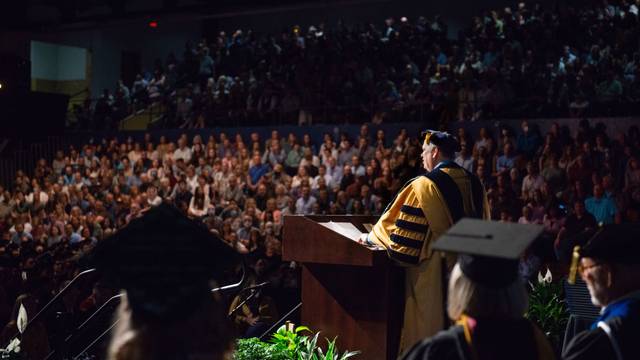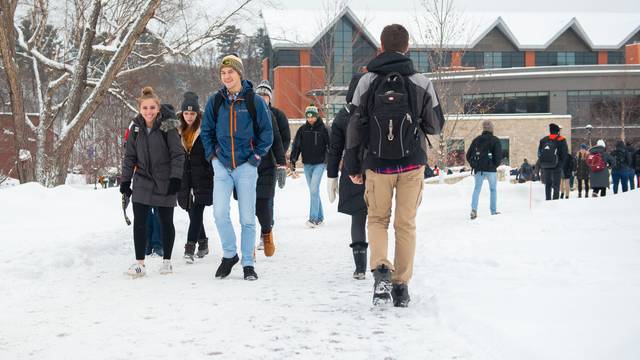Photo caption: For Tyler Gonzales, few things are as fulfilling as solving yet another complicated mathematical puzzle, a passion that is now taking him across the country for his Ph.D.
If there were record books for mathematics at the University of Wisonsin-Eau Claire, chances are that graduating senior Tyler Gonzales would be in them.
For instance, by the spring of his sophomore year and the announcement of his Goldwater Scholarship, the Eagan, Minnesota, native had already taken more math courses than many seniors in the major at that time. It is clear now that he was just getting started in his exceptional student career.
In his time as an undergraduate, Gonzales also earned a Blugold Fellowship and became a Ronald E. McNair Scholar; he was offered multiple summer research internships through the National Science Foundation at the Massachusetts Institute of Technology and the University of Michigan-Dearborn, among others; and he enrolled in the University Honors Program, presenting his honors thesis in March of 2021.
All these opportunities to complete collaborative student-faculty research and fine tune his interests in mathematics made Gonzales one of the strongest graduate school applicants for mathematics in the country.
Gonzales’ story of mathematics excellence is not yet over.
Ivy League and Ph.D. bound
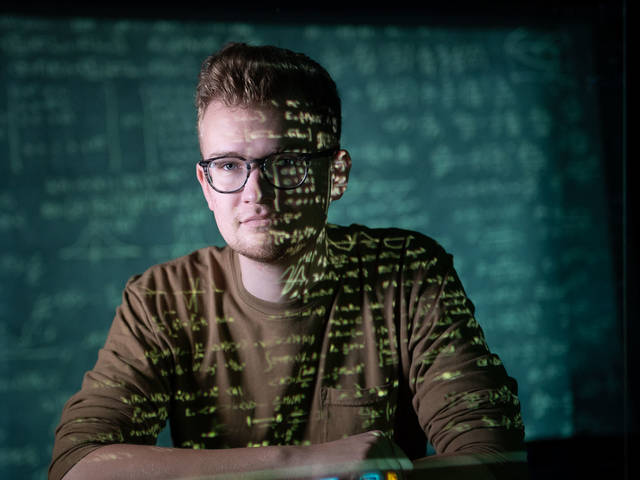
A history buff at heart, Gonzales looks forward to living in a new part of the country, becoming part of a new community of scholars and taking in the American history surrounding Yale's historic location.
When an extraordinary student in mathematics starts looking at graduate school programs, the usual choices rise to the top on the list of considerations — Oxford, Harvard, Princeton and MIT were all considered. As a senior, Gonzales found himself deciding between applied mathematics Ph.D. programs at Cornell and Yale University.
In the end he chose Yale, in part because he felt it was the program that would offer him the kind of collaborative peer-to-peer environment among faculty that he has become accustomed to at UW-Eau Claire.
“It’s a small program, comparatively, about a dozen total candidates from around the globe,” Gonzales says. “The faculty research interests most closely align with my own, and I am confident that I’ll be able to resume the kind of collaborative working relationships with them that I’ve enjoyed here with our incredible faculty.”
Dr. Samuel Scholze, assistant professor of mathematics at UW-Eau Claire, worked with Gonzales as his faculty mentor and honors thesis advisor, and attributes his student’s success to rare levels of natural talent, work ethic and efficiency.
“Tyler came to UWEC with a very strong mathematical background and has pushed himself very hard over the past four years,” Scholze says. “He is now working in topics that most mathematicians do not see until graduate school, if ever. At this point, working with Tyler is more like collaboration with a colleague than mentoring a research student.”
Entering graduate school with vast research experience
Gonzales says it’s hard to effectively describe the impact that all of his unique and advanced-level research opportunities have had on his undergraduate career. He says that beyond the mathematics and research technique knowledge he gained, the network of research colleagues he has been able to build over these years has changed the course of his future.
“I have done a number of research internships, and each has had impact on my professional goals,” Gonzales says.
“As a summer research intern at MIT, I worked on a project involving numerical astrophysics and presented my research at a virtual conference. I also attended life-changing workshops that changed the way I think about STEM in general and helped me prepare for the rigorous process of graduate school applications and interviews.”
While completing another summer research internship at the University of Michigan-Dearborn, Gonzales worked on a team that has published one peer-reviewed paper of their findings and continues collaboration on a second paper for submission to a peer-reviewed journal.
“My internships have shaped my research interests, brought valuable connections in the field and ultimately helped me identify the graduate programs most suited to me.”
As he narrowed his choices through the application process, the program at Yale won out, for several reasons.
“There were other programs that absolutely piqued my interest, but the thing about Yale is their tradition, and their track record of excellence in my program, applied mathematics,” he says. “Knowing that the research interests of the faculty closely align with mine was also key.”
As a history buff, Gonzales admits that the East Coast location of New Haven, Connecticut, has an appeal he could not deny.
“I can see firsthand the sites of so much history,” he says. “It is home to many of the first moments of our great country, and I am thrilled to be headed to live so close to where this nation was founded.”
One last collaboration, one extensive interdisciplinary project
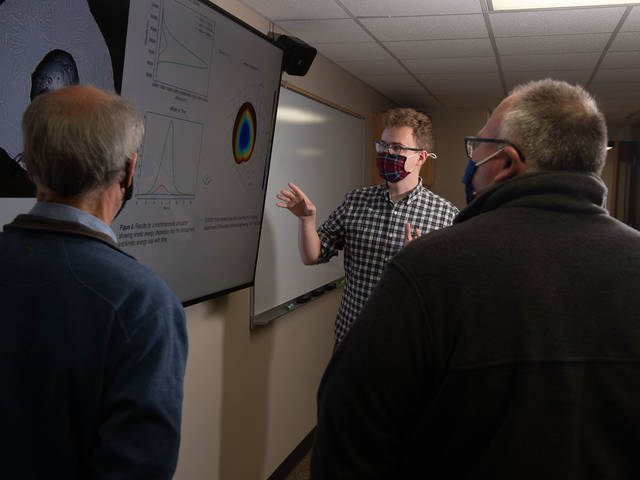
Tyler Gonzales reviews parts of his research presentation with Drs. Phil Ihinger and Paul Thomas.
In his final semester as a Blugold, along with his senior thesis, Gonzales has been conducting collaborative research with Dr. Phillip Ihinger, professor of geology, and Dr. Paul Thomas, professor of physics and astronomy. The faculty pair approached Gonzales about fusing his math skills with a project they had in mind to track and project the path of tiny micrometeorites.
“Tyler’s research follows the life paths of tiny rock fragments flying around in space that collide with the Earth on its orbit around the sun,” Ihinger says. “Modeling the temperature-time histories of these meteorites is essential to our understanding of the role that these objects play in the evolution of our atmosphere and, potentially, the origin of life. Tyler’s mathematics allows us to understand which variables play the important roles in controlling the thermal evolution of the micrometeorites.”
About their student research partner on this complex scientific examination, both Ihinger and Thomas have enjoyed the exchange of ideas and collaborative process throughout the project.
“Tyler has a wonderful sense of curiosity,” Thomas says. “He is always excited by new ideas and very eager to learn new things. This is a really great quality that will serve him very well in his life.”
Echoing this thought, Ihinger sees in Gonzales a work style and self-confidence as a scientist that is rare for his age and will help propel him through his Ph.D. program.
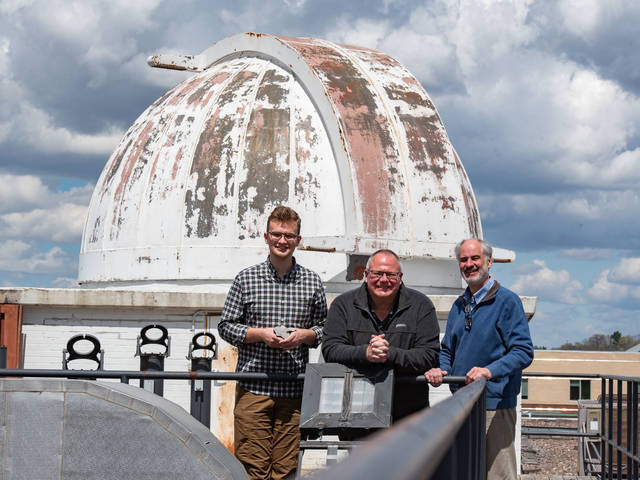
Tyler Gonzales, holding a meteorite, Dr. Paul Thomas (center) and Dr. Phillip Ihinger on the roof of Phillips Hall, where micrometeorites can potentially be gathered with magnetic equipment.
“Remarkably, Tyler has the confidence that he can solve whatever problem is given to him,” Ihinger says. “He knows that ‘science works,’ and that the answer to any problem is out there and within his reach. This confidence contributes to the relaxed approach that he carries into the worlds of math and science — rare to see in college undergraduate students.”
Seeking answers and finding balance
When Gonzales departs UW-Eau Claire this month with his bachelor’s degree in hand, that calm confidence Ihinger notes will be yet another advantage he brings to the hallowed halls of Yale University — that, and a whole lot of talent.
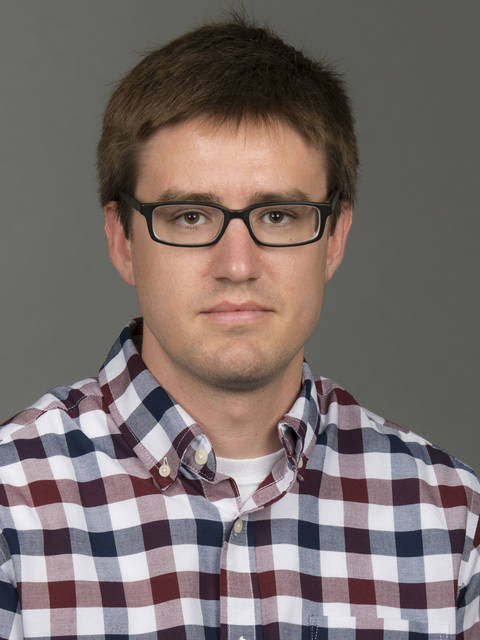
Dr. Sam Scholze, assistant professor of mathematics
While highlighting Gonzales’s natural abilities and tendency to push himself very hard, Scholze minced no words in his parting thoughts about his mentee and advisee over the last four years.
“Simply put, Tyler is the most talented student that I have ever had the pleasure to work with,” Scholze says.
What Gonzales says he will miss the most about UW-Eau Claire is the community of scholars of which he has become an integral part, beginning with his early Blugold Fellow experiences, building through his McNair program and Goldwater Scholar work and sustaining him in this last year of collaborative research.
“These experiences have allowed me to enter into a community of scholars who value greatness, both within scholarly work and their personal lives,” he says. “We have shared a common goal: To pursue the highest levels of excellence and contribute greatly to our area within STEM. I’ve made lifelong friends across different disciplines, diverse cohorts of scholars. These experiences have helped me reach the place I am today.”
One early lesson Gonzales cites as being very valuable to his journey came from an honors class called “Finding Balance: An Investigation of Women, Work and Family” taught by Dr. Kristine Knutson, associate professor of communication and journalism.
“This class allowed me to explore ways to find balance, especially when life gets tough,” he says.
“I am still working on finding balance in life, and maybe I always will. But taking that course taught me how important it is to try.”
